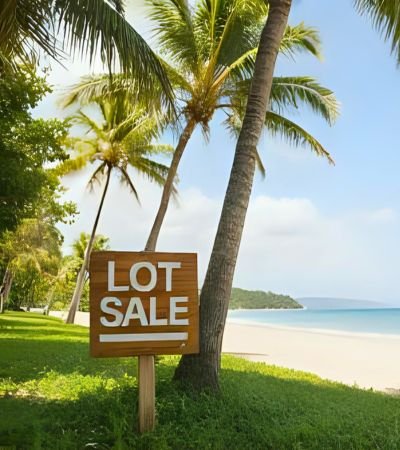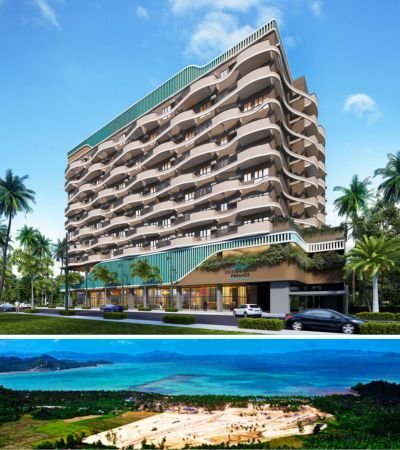Featured Hotel/Condo:

Palawan Islands for Sale
Let's Connect!
Looking for the perfect property or ready to make your next big move? Let’s connect and turn your real estate dreams into reality—reach out today!
Featured Hotel/Condo:

Buying an Island in Palawan: A Comprehensive Guide to Opportunities, Risks and Safe Investment
There is a certain romance to owning your own island. The idea of waking up to pristine white beaches, turquoise waters and lush jungle all of your own has long captured the imagination of adventurers and investors alike. In the Philippines, nowhere embodies that dream quite like Palawan. Often called the last ecological frontier, the archipelagic province is a mosaic of over 1,700 islands with world-class beaches, spectacular reefs and a remarkable biodiversity. With tourism booming and real estate developers setting their sights on this natural paradise, many people wonder whether buying a whole island here is possible, what it entails and how to do it responsibly. This guide will equip you with everything you need to know.
Why Buy an Island in Palawan?
Palawan’s islands are regularly ranked among the world’s most beautiful, drawing visitors from across the globe. For investors, owning an island in this province can mean private seclusion and luxury, but also serious potential for sustainable tourism development. Here are the most compelling reasons why people choose to invest in entire islands here.
1. Stunning Natural Beauty and Biodiversity
Palawan is home to some of the finest seascapes on earth. Tropical islands with dramatic limestone cliffs, crystal-clear waters and white-sand beaches are surrounded by rich coral reefs teeming with marine life. Inland, there are rainforests that shelter unique species found nowhere else. An island property here grants exclusive access to this natural splendor and the opportunity to steward an ecological treasure. For many buyers, preserving and enjoying this beauty is a prime motivation.
2. Privacy and Exclusivity
Owning an entire island offers unmatched privacy. You control access, ensuring tranquility away from urban noise and prying eyes. This exclusivity appeals to high-net-worth individuals, celebrities and anyone seeking a refuge for rest and relaxation. It also allows owners to host intimate gatherings or retreats without disturbance. In Palawan, where many islands remain uninhabited or lightly populated, solitude is an inherent part of the investment.
3. Potential for Eco-Friendly Tourism Development
Palawan’s tourism sector has grown rapidly over the last decade. Carefully planned eco-resorts, boutique hotels and luxury villas cater to the rising demand for sustainable travel experiences. Owning an island can give you a head start in this market, provided you develop in harmony with nature and comply with environmental laws. A well-managed resort can generate steady income and employment for local communities. Investors with long-term vision can harness the tourism boom while promoting conservation.
4. Adventure and Lifestyle
Beyond investment, owning an island opens up a lifestyle of adventure and connection to nature. Imagine kayaking along mangrove-lined coastlines, snorkeling among vibrant reefs or simply strolling along your own beach at sunset. For those seeking a slower pace and outdoor activities, an island provides endless opportunities. It also offers a chance to learn about marine ecosystems, local cultures and sustainable living practices.
The Realities and Challenges of Island Ownership
While the benefits of owning an island are alluring, potential buyers must approach the purchase with eyes wide open. There are significant challenges and responsibilities that come with island ownership in Palawan. Failing to consider these factors can lead to financial loss, legal complications or environmental damage. Below are key disadvantages and potential pitfalls.
1. Legal and Regulatory Complexity
One of the most challenging aspects of island ownership in the Philippines is navigating the legal framework. Many islands are not freely available on the market because they fall under protected areas, indigenous ancestral domains or unclassified forest land. Philippine law stipulates that only land classified as alienable and disposable may be privately owned, and some islands can only be transferred through special legislative acts. Understanding land classification and ensuring that a property has legitimate and uncontested title is crucial. This complexity often requires working closely with legal experts, the Department of Environment and Natural Resources (DENR) and local authorities to verify that ownership is possible and lawful.
2. Environmental Restrictions
Palawan is one of the country’s biodiversity hotspots, and many parts are designated as protected areas under national laws. Environmental regulations prohibit the sale or development of land within these zones. Even islands located outside protected areas often have sensitive ecosystems such as mangrove forests, coral reefs and breeding sites for wildlife. Responsible ownership means committing to conservation, adhering to environmental impact assessment procedures and potentially placing limitations on development. Investors must be prepared to work within strict environmental guidelines and in some cases maintain large portions of the island in their natural state.
3. Infrastructure and Accessibility
Owning an island means dealing with isolation. Many Palawan islands lack basic infrastructure such as fresh water supply, electricity, waste management and reliable transportation. Developing these facilities from scratch can be expensive and logistically challenging. You might need to build solar or wind power systems, desalination plants, rainwater harvesting systems and septic systems. Accessibility is another concern: the island should be reachable by boat or seaplane, and seasonal weather conditions can affect travel. Unless the island is near larger towns, establishing regular supply lines for building materials, provisions and staff can prove difficult.
4. Cost and Maintenance
The purchase price of an island is only the beginning. The cost of due diligence, legal services, environmental studies and obtaining permits can add up. Developing infrastructure and sustainable accommodations is a significant investment. After purchase, owners must budget for maintenance, security, environmental management and staff wages. The remote nature of island properties often means maintenance is more costly than on the mainland. It’s vital to have a clear financial plan, including contingency funds for unforeseen expenses.
5. Socio-Cultural Considerations
Palawan is home to indigenous groups whose ancestral domains cover parts of the province. Respecting indigenous rights and local customs is not only a legal obligation but also a moral one. In many cases, island development plans must involve consultation and consent from indigenous communities, and some islands cannot be sold to anyone outside the community. Even when the land is legally transferable, engaging with local leaders and ensuring that island projects bring benefits to nearby communities fosters goodwill and social sustainability.
Legal Framework: Understanding Land Classification and Ownership
Before you even consider making an offer on an island in Palawan, it’s critical to grasp the legal framework surrounding land ownership in the Philippines. Without this knowledge, you could inadvertently purchase land that cannot legally be sold or developed, leading to disputes or loss of investment.
Alienable and Disposable Lands vs. Forest Lands
Philippine law distinguishes between alienable and disposable (A&D) lands and forest or public lands. A&D lands have been explicitly declared by the government as open for private ownership or homesteading. They include agricultural land and certain reclassified areas. Forest lands, reserves, mineral lands and national parks, on the other hand, belong to the State and cannot be sold. Islands often fall into the category of forest or unclassified public land unless a special proclamation has made them A&D. To determine whether an island is eligible for private ownership, you need an official certification from the authorities confirming that it has been declared A&D.
Protected Areas and the Expanded NIPAS Law
The National Integrated Protected Areas System (NIPAS) law was enacted to safeguard ecologically significant regions across the country. Under the expanded NIPAS Act, protected areas cannot be sold, mortgaged or leased. Many of Palawan’s most spectacular islands – such as those within the El Nido–Taytay Managed Resource Protected Area, the Puerto Princesa Subterranean River National Park and the Tubbataha Reefs Natural Park – fall under this category. Even islands outside the core protected areas may be in buffer zones, where activities are restricted. Always consult the Protected Areas Management Board (PAMB) and DENR to verify the status of any island you are considering.
Ancestral Domains and Indigenous Rights
Philippine law recognizes the rights of indigenous communities over their ancestral domains. This is particularly relevant in Palawan, where indigenous groups such as the Tagbanua, Palaw’an and Cuyonon have ancestral claims. These lands cannot be transferred to non-members of the community except through limited provisions. If you are considering an island that lies within an ancestral domain, the sale may not be valid unless you are a member of the community. It is vital to check whether a property is covered by a Certificate of Ancestral Domain Title (CADT) or by local claims and to respect indigenous peoples’ rights.
Special Acts and Reclassification
Occasionally, Congress passes special laws reclassifying specific islands as A&D land. For example, Cowrie Island near Puerto Princesa was reclassified from timberland to alienable and disposable land through legislation. These laws are rare and usually come with conditions regarding environmental management and community benefits. Unless a similar act covers the island you are interested in, assume it remains State-owned and cannot be privately acquired.
Steps to Safely Purchase an Island
Given the complexity of land ownership and the environmental and cultural considerations in Palawan, purchasing an island requires careful planning and due diligence. Here is a step-by-step guide to help you navigate the process safely and ethically.
1. Conduct Preliminary Research
Start by gathering as much information as possible about the islands available for sale. Determine the exact location, size, current uses and any structures on the property. Understand the asking price and compare it with similar properties to assess fairness. Research the surrounding area: Are there nearby communities? How close is the nearest town? Are there existing environmental issues such as illegal logging or overfishing?
2. Verify Land Classification and Title
The most crucial step is to verify that the island is classified as alienable and disposable. You should request a land classification certification from the Land Management Bureau or the local DENR field office. Check for existing titles and ensure that the title chain is complete, meaning there are no overlapping claims or encumbrances. A title should be free from disputes, mortgages or adverse claims. Work with a licensed geodetic engineer to verify boundaries and ensure that the island described in the title matches the physical island on the ground.
3. Confirm Environmental Status
Consult the Protected Area Management Board to verify whether the island falls under a protected area or its buffer zone. If it does, ask the board about allowable activities and whether private ownership is permitted. For islands outside protected areas, you may still need to secure an environmental compliance certificate (ECC) before any development. Engage with environmental consultants to conduct an initial assessment of ecosystems such as coral reefs, seagrass beds, mangroves and wildlife habitats. Such studies inform whether the island is suitable for your intended use and what environmental safeguards you need to implement.
4. Investigate Ancestral Domain Claims
Before proceeding further, investigate whether the island is part of an ancestral domain. Contact the National Commission on Indigenous Peoples (NCIP) and local tribal councils for official records. If the island lies within an ancestral domain, determine whether the community allows non-members to own or lease parts of the land. Often, indigenous groups will not sell land outright but may consider partnerships or joint ventures that provide community benefits. If you attempt to purchase ancestral land without proper authorization, the transaction will be void, and the community has the right to redeem the property.
5. Engage a Licensed Real Estate Broker
Because of the legal and cultural complexities of buying island property in Palawan, working with a licensed real estate broker or attorney is not just advisable – it is essential. Licensed brokers are regulated professionals who have undergone training and examination, giving them knowledge of Philippine property laws and ethical standards. They can help identify legitimate properties, negotiate terms, prepare documentation and coordinate with government agencies. Most importantly, a licensed broker can protect you from fraudulent transactions and land scams, which are unfortunately common in island deals.
6. Plan for Environmental Impact and Sustainability
Even if your primary goal is private use, you will still need to manage the island’s environment responsibly. Have a comprehensive plan that outlines how you will protect habitats, prevent pollution, manage waste and monitor resource use. If you plan to build structures or operate a resort, you will need to conduct an environmental impact assessment and secure an ECC. Consider low-impact building techniques, renewable energy systems and water management strategies. Sustainable design not only protects the island but also appeals to eco-conscious travellers and investors.
7. Consult Local Government Units
Island transactions often require approval or clearance from local government units (LGUs), particularly the municipality and barangay where the island is located. These authorities can provide information on zoning, taxes, local ordinances and community concerns. Meeting with the mayor or barangay captain early in the process fosters transparency and cooperation, which are critical for a smooth transaction.
8. Secure Permissions and Execute the Sale
Once all checks are completed, work with your broker and lawyer to prepare the necessary contracts, including the deed of sale and supporting documents. Depending on the island’s status, you may need approvals from the DENR, NCIP, LGUs or the Protected Area Management Board. Ensure that taxes and fees such as the documentary stamp tax, transfer tax and registration fee are paid. After registration, you should receive the transfer certificate of title under your name, proving legal ownership.
9. Develop Responsibly and Respectfully
Ownership does not end with the purchase; it brings long-term responsibilities. If you plan to build or develop the island, work closely with environmental experts and comply with all regulations. Consider the needs of local communities and involve them in planning. Sustainable tourism development that provides jobs, supports local culture and protects the environment can be a model for responsible island ownership. Even if you intend to keep the island as a private sanctuary, ensure that your activities do not harm ecosystems or violate environmental laws.
The Role and Importance of Licensed Brokers and Attorneys
Island transactions involve significant amounts of money, complex legal documents and considerable risk. Engaging professionals is essential for a safe transaction. Here is why licensed brokers and attorneys are integral to your success.
Expertise in Law and Regulations
Licensed brokers and real estate lawyers understand Philippine property laws, environmental regulations and the intricacies of land classification. They know how to check titles, interpret land classification maps and navigate government procedures. Their expertise ensures that you are not purchasing land that is subject to future disputes or government reclamation.
Access to Legitimate Listings
Professionals have networks and resources to identify legitimate island properties that are actually for sale. They can quickly filter out listings that are illegally offered, overpriced or misrepresented. A licensed broker is held to ethical standards and should prioritize your interests over pushing any property for sale.
Negotiation and Documentation
Real estate professionals can handle negotiations with sellers, ensuring that terms are fair and transparent. They prepare and review legal documents such as deeds of sale, contracts and powers of attorney. A lawyer ensures that the contract includes necessary safeguards and clear terms for payment, title transfer and contingencies.
Protection Against Fraud
Land scams are common in provinces with rising property values. Scammers might sell land they do not own or present forged titles. A licensed broker’s duty is to verify authenticity and advise you on potential risks. Lawyers can independently validate documents and ensure the transaction is legitimate. If any red flags arise, professionals can help you back out gracefully before you lose your deposit.
Advantages of Island Ownership: A Deeper Look
Now that we have discussed the responsibilities and risks, let us revisit the advantages with more context. Owning a private island in Palawan can be rewarding if approached responsibly.
Ecotourism Opportunities
Ecotourism is one of the fastest-growing segments in global tourism. Travellers are increasingly seeking experiences that allow them to connect with nature while leaving minimal impact. By developing an eco-resort or sustainable villas on your island, you can tap into this market while preserving the environment. Features like solar-powered accommodations, locally sourced materials, recycling programs and community-guided nature walks can create a unique selling point. The revenue generated can fund conservation efforts and support nearby communities through employment and social projects.
Long-Term Investment Potential
Palawan’s reputation as an international destination has been rising steadily. Infrastructure projects such as the expansion of Puerto Princesa International Airport and improved roads increase accessibility, making islands more attractive to tourists and investors. While island real estate is niche, well-located properties in tourist corridors can appreciate significantly over time, especially as scarcity drives demand. Investors who hold and develop islands responsibly stand to gain from capital appreciation and recurring income.
Personal Enjoyment and Legacy
For many buyers, the greatest return is personal satisfaction. Spending time on a private island with family and friends, exploring marine life or building a retreat where you can work creatively in isolation are priceless experiences. Owning an island is also a unique legacy asset that can be passed down through generations. By preserving the island and developing it sustainably, you leave future generations a natural treasure and a living example of stewardship.
Contribution to Conservation
Responsible owners play an important role in conservation. Many islands face threats such as illegal fishing, logging and unregulated tourism. Private ownership can help protect these ecosystems, particularly when owners invest in conservation programs, enforce anti-poaching measures and collaborate with NGOs and government agencies. Some owners even establish private nature reserves, research stations or coral nurseries. Owning an island can thus be an act of conservation rather than exploitation.
Disadvantages and Risks: What to Weigh Carefully
No investment is without its downsides. Island ownership is complex and may not suit everyone. Here is a detailed look at the disadvantages and how to address them.
Legal Uncertainty
Even with diligent research, regulations can change and government agencies can reclassify land. Political shifts might lead to different priorities in land use or stricter environmental enforcement. Sudden reclassification can alter your ability to develop or even keep the property. To mitigate this risk, stay engaged with regulatory developments, maintain good relationships with local officials and have contingency plans.
Liquidity Challenges
Islands are unique assets that may not be easy to liquidate quickly. There are few buyers who can afford entire islands, and the pool shrinks further once you factor in the legal and environmental complexities. If circumstances require you to sell, you may face a limited market, which could affect your ability to get a fair price promptly. Consider your financial situation and whether you are comfortable tying up significant capital in an illiquid asset.
Natural Hazards
Palawan is generally less prone to typhoons than other parts of the Philippines, but severe weather events do occur. Islands can be exposed to storm surges, heavy rains and strong winds. Erosion, rising sea levels and climate change pose long-term threats. Before purchasing, research the island’s topography and climate risk. Implement coastal protection measures like mangrove reforestation and ensure that buildings are designed to withstand extreme weather.
Logistics and Supply
Running an island property requires reliable logistics. Supplies, construction materials, fuel and food must be shipped in, sometimes through rough seas. Unexpected weather can disrupt schedules. To manage logistics effectively, plan for storage of essential supplies, develop good relationships with local boat operators and consider investing in appropriate transport options like a service vessel. For tourism operations, contingency plans for guest safety and evacuation are vital.
Staffing and Management
Owning an island means you will need people to maintain it. This includes caretakers, security, maintenance personnel and, if you run a resort, hospitality staff. Finding qualified and trustworthy staff can be challenging in remote locations. Investing in training, fair wages and good working conditions fosters loyalty and reduces turnover. Consider management companies that specialize in remote properties if you cannot be hands-on.
Red Flags and Common Pitfalls in Island Buying
Knowing the risks is one thing; avoiding pitfalls is another. Here are common red flags and how to steer clear of them.
Too Good to Be True Deals
If a price seems far below market value, investigate thoroughly. The land might not be legally sellable, the title may have defects or there may be hidden issues like boundary disputes. Ask why the property is priced so low and require full disclosure from the seller.
Unverified Titles and Fake Documents
Unfortunately, forged titles and fabricated documents are common in land scams. Always request original documents, check them with the Register of Deeds and cross-reference with land classification maps. Use the services of licensed brokers and attorneys who can detect irregularities.
Ignoring Local Communities
Buying a property without consulting local residents and indigenous communities is a recipe for conflict. In Palawan, community involvement is not only ethical; it’s often a legal requirement for obtaining permits. Early engagement fosters cooperation and helps you understand local customs and concerns.
Skipping Environmental Assessments
Environmental studies might seem like an extra cost, but they are essential for the long-term viability of your investment. Skipping assessments can lead to fines, project shutdowns or irreversible ecological damage. Conducting environmental due diligence early can also reveal opportunities for conservation partnerships.
Underestimating Costs
The beauty of an island can make you overlook the financial realities. Hidden costs such as back taxes, debt obligations, or the need to build infrastructure can quickly erode your budget. Request a comprehensive breakdown of expenses from your broker and allocate funds for contingencies.
Tips for Responsible and Rewarding Island Ownership
To maximize the benefits of island ownership and minimize risks, follow these practical tips:
- Research and Patience: Island purchases take time. Thoroughly research the property, regulations and community context before making offers.
- Build a Professional Team: Engage licensed real estate brokers, experienced lawyers, environmental consultants and accountants. Their combined expertise will safeguard your investment.
- Engage Early with Authorities: Communicate with the DENR, NCIP and local government units from the outset. Securing their approvals and support is essential.
- Respect Indigenous Rights: Identify whether your island has ancestral land claims. If it does, collaborate rather than compete with the indigenous community.
- Plan for Sustainability: Implement eco-friendly designs, renewable energy systems and effective waste management to reduce your ecological footprint.
- Budget for the Long Term: Include legal fees, environmental studies, infrastructure, maintenance and contingency funds in your budget.
- Stay Informed: Laws and regulations evolve. Keep track of legislative changes and environmental policies that could affect your property.
- Have a Management Strategy: Whether you live on the island or not, appoint competent caretakers or consider a property management company to oversee operations.
Encouraging Responsible Investment
While the hurdles can seem daunting, they should not deter passionate investors who genuinely care about Palawan’s future. When done correctly, island ownership can be a force for good. Thoughtful development brings economic opportunities to remote communities, funds conservation and sets examples for sustainable tourism. The keys to success are due diligence, respect for law and culture, and a commitment to environmental stewardship.
Nurturing Local Partnerships
One of the greatest strengths of Palawan lies in its people. By forging partnerships with local communities, investors gain valuable insights, skilled labor and cultural richness. These partnerships can take many forms, from employment and training programs to joint ventures that give local stakeholders a share in profits. Strong relationships help mitigate conflict, ensure smooth operations and give your project a sense of belonging. When island owners become part of the community, everyone benefits.
Leveraging Technology for Conservation
Modern technology offers tools to manage and protect your island. Renewable energy systems like solar panels and wind turbines reduce reliance on diesel generators. Advanced water treatment and desalination technology provide fresh water without harming aquifers. Drones and satellite imagery can monitor illegal fishing or logging, while digital guest management systems improve eco-resort efficiency. Embracing technology enhances sustainability and reduces long-term costs.
Adapting to Climate Change
Climate change impacts are already affecting island ecosystems. Sea-level rise, ocean acidification and stronger storms are realities that owners must plan for. Adaptation measures include setting buildings back from the shoreline, using elevated or resilient architectural designs, restoring mangroves and corals, and participating in coastal protection initiatives. Investing in climate resilience safeguards your property and demonstrates forward-thinking management.
The Courage to Invest Wisely
Owning an island in Palawan is a dream within reach for those who are committed to doing it right. The province’s exceptional beauty and growing tourism appeal provide strong incentives for investment. However, the dream should not eclipse due diligence. Legal classification, environmental status, indigenous rights and community engagement are critical factors that cannot be overlooked. Success lies in finding a balance between private enjoyment, financial return and social and ecological responsibility.
A licensed broker can guide you through the maze of requirements, from verifying titles to securing permits. Real estate lawyers ensure legal compliance, while environmental consultants help protect natural assets. When you take the time to build a professional team, engage with local communities and develop sustainably, island ownership becomes more than a personal trophy—it becomes a meaningful contribution to conservation and community development.
If you have the passion and courage to invest in Palawan’s islands responsibly, you will not only acquire a piece of paradise but also help shape a sustainable future for one of the world’s most extraordinary places.
Top Selling Properties
SanVicente Realty
+63 938 211 [VIEW]





